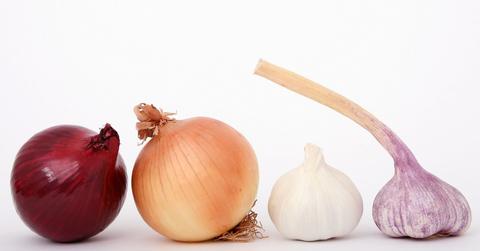
CC0 Public Domain via MedicalXpress
Risk of Breast Cancer Reduced with Onion and Garlic
By Ash CSept. 24 2019, Published 9:17 p.m. ET
According to a study led by University of Buffalo and University of Puerto Rico researchers, onions and garlic may be a recipe to reduce the risk of breast cancer. The study was conducted between 2008 and 2014 and included 314 women with breast cancer and 346 control subjects, in investigation of the association between the two ingredients’ consumption and breast cancer in Puerto Rico, and the results were published in the journal Nutrition and Cancer.
“Among Puerto Rican women, the combined intake of onion and garlic, as well as sofrito, was associated with a reduced risk of breast cancer,” said Gauri Desai, an epidemiology PhD student at the Buffalo university and the lead author of the study. Onions and garlic are also key ingredients in sofrito – a staple condiment of Puerto Rican cuisine.
Findings showed that participants who consumed sofrito more than once a day had a 67% decrease in risk of compared to those who never ate it. “Studying Puerto Rican women who consume a lot of onions and garlic as sofrito was unique,” Desai added that the idea for the study was from previous scientific research that said eating onions and garlic may have a protective effect against cancer; and that the total intake of onions and garlic was linked with risk of breast cancer – not sofrito alone.
Puerto Rico has a lower breast cancer rate compared to the mainland US, which made it an important and viable population for the study. Desai noted that people there consume larger amounts of onions and garlic than in Europe and the U.S because of the popularity of sofrito, as well as “guisos“ (stews) and bean- and rice-based dishes in Puerto Rican cuisine which also contain onions and garlic.
“There is very little research on breast cancer in Puerto Rico. This study was a collaboration between my colleagues here at UB and at the University of Puerto Rico to help us understand why rates there are lower than in the rest of the U.S, and why rates there are continuing to decrease while they are increasing in the rest of the United States,” expressed the study’s co-author Jo Freudenheim, PhD, as well as the chair of epidemiology and environmental health at UB. Onions and garlic are rich in flavonols and organosulfar compounds, which show anti-carcinogenic properties in humans.

